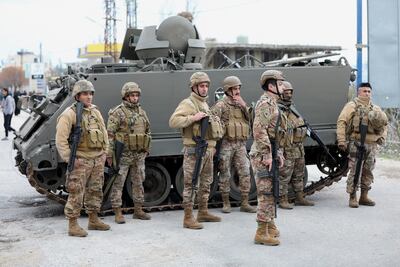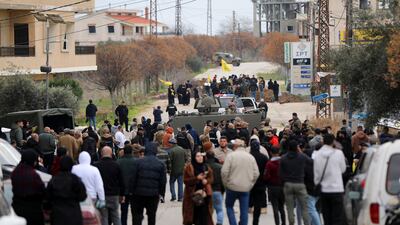Live updates: Follow the latest on Israel-Gaza
At least 22 people were killed, including a Lebanese soldier, and more than 120 injured after the Israeli military opened fire on them in south Lebanon, the Lebanese health ministry said. It attacked residents who were trying to return to their homes as a 60-day deadline for Israeli troops to withdraw from south Lebanon expired.
The Israeli army claimed it had fired warning shots in multiple areas of southern Lebanon on Sunday after detecting threats posed by approaching people. The military said several suspects, who it claimed posed an imminent threat to troops, were detained and are being questioned.
Dramatic footage from local media outlets showed Israeli soldiers dragging a man out of a building and detaining him in the village of Houla. Other videos showed civilians standing face to face with an Israeli tank as locals, displaced from their homes for more than a year, sought to return.
The Israeli government had signalled on Friday that it intended to stay because the terms of a US-brokered ceasefire deal with Hezbollah had not been fully implemented. Israel has not said how long its forces would remain in the south.
Under the terms of the deal, the Lebanese Army and UN peacekeepers (Unifil) are supposed to deploy and increase their presence in the south as Israel withdraws. The Lebanese army has done so in many areas, but not all.
On Sunday, it slammed Israel for “its refusal to abide by the ceasefire agreement and withdraw from” Lebanon, after it accused it on Saturday of procrastinating.
In a joint statement, the top UN official in Lebanon and the commander of Unifil said “as seen tragically this morning, conditions are not yet in place for the safe return of citizens to their villages along the Blue Line”.
“Displaced communities, already facing a long road to recovery and reconstruction, are therefore once again being called on to exercise caution.”
A separate Unifil statement said Israel “must avoid firing at civilians within Lebanese territory” while urging Lebanese people to adhere to the directions of the Lebanese Army.
Outgoing Lebanese Prime Minister Najib Mikati called on the countries sponsoring the ceasefire deal to “assume their responsibilities” by stopping Israel's violence and ensuring their soldiers leave Lebanese soil.
In Maroun El Ras, a transmission engineer working for Russia Today, was injured when Israeli opened fire on their reporting team.
The villages sit directly on the border that has been occupied by Israeli soldiers.
Lebanon's National News Agency reported that Israeli forces opened fire on residents of the villages after they crossed a barricade put up by Israeli forces.

Earlier on Sunday, Israeli military official Col Avichay Adraee ordered residents not to return to villages near the border. “No return to the village line marked on the map is permitted,” he said alongside a map which included Kfar Kila and Houla.
The White House said on Friday that a short, temporary ceasefire extension was urgently needed.
Dozens of villages in the south have been almost reduced to rubble by Israel, which claims it is striking and destroying Hezbollah's infrastructure. Lebanon has accused Israel of breaching the ceasefire deal hundreds of times.
“Lebanon's sovereignty and territorial integrity are non-negotiable, and I am following up on this issue at the highest levels to ensure your rights and dignity,” President Joseph Aoun said on Sunday.
Mr Aoun, who was recently an LAF commander, was elected earlier this month. It's hoped that his election, along with the designation of Prime Minister Nawaf Salam could bring new hope to Lebanon, a country that has been riddled with a myriad crises.
Among them was Israel's brutal war on the country, which killed more than 4,000 people. While Israel did succeed in wiping out Hezbollah's senior leadership, it also levelled numerous parts of Lebanon.


